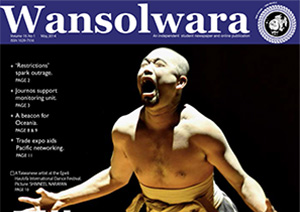
SUVA (Wansolwara / Pacific Media Watch): A student editor from the regional University of the South Pacific has appealed for a return to “fearless, fair and determined” journalism as Fijians prepare for the first general election in September since the military coup of 2006.
“Journalists will to have to work themselves to the bone to overcome their own lack of experience and transcend a timid media environment borne in part of coups, censorship, restrictions and harassment,” wrote Tevita Vuibau in the latest edition of Wansolwara.
The newspaper also “vowed to do our bit” to help “usher in a new era of democracy for Fiji”.
The award-winning journalism programme newspaper Wansolwara is published as a liftout in the daily newspaper Fiji Sun. Tevita Vuibau’s editorial said:
When we check that one box, for that one candidate on that one day in September, many of us in Fiji will for the first time be exercising our democratic right to vote.The year 2014 will indeed be measured by a plethora of firsts, especially for Fiji’s youth since the voting age was lowered to 18 years in 2009.
The looming general election is hailed as Fiji’s first truly democratic election, the first since 2006, and the first in which a new voting system will be used.
And this time of firsts is especially crucial for the great number of Fiji’s late teen to twenty-something journalists, because they will be reporting on a democratic process in which – given eight long years of military rule – they have never taken part.
These politically inexperienced reporters, editors and producers carry the immense responsibility of digging out everything the public needs and deserves to know in order to make a properly informed choice at the ballot box.
If this country is truly to return to democracy in September, then citizens require fearless, fair and determined reporting that deliver as much in-depth information and analysis as possible about all the candidates, their policies, and the host of problems and opportunities facing Fiji.
Journalists will to have to work themselves to the bone to overcome their own lack of experience and transcend a timid media environment borne in part of coups, censorship, restrictions and harassment.
For the sake of a democratic and transparent Fiji, an egalitarian and inclusive Fiji, the time has come for critical questions to be asked, investigations to be undertaken and concerns to be addressed and explored.
In this year of our return to democracy, we want journalism to rise again, and to see an end to the era of the ‘churnalist’ – press release writers and other reporters in too much of a hurry or too anxious to ask real questions.
However, this time that should bring out the finest in our press corps comes as Fiji’s media faces scrutiny and control both internally and externally and, in many cases, come off second best. Since 2006 our press have contended with interference ranging from blatant censorship and soldiers in newsrooms through to punitive decrees and regulation under the Media Industry Development Association (MIDA).
But could Fiji’s journalists do more?
Fear, timidness and meekness – whether real or imagined – are assumed to be the rule by many media practitioners and observers in and out of Fiji, yet exceptions do exist. And with courage, skill, and determination, the press can and will do more to become a true Fourth Estate.
When MIDA chairman Ashwin Raj promised at USP’s World Press Freedom Day panel to support journalists as long as they stood by their ethics many newsrooms may have listened with interest and journalists will hold him accountable to it.
Nevertheless, our experiences, and our opportunities to prove ourselves grow with each story we cover as Fiji approaches the general elections.
At USP’s journalism department, where Wansolwara is published, the signs are good. The press freedom panel, compelling and, at times, fiery, showed that there is an appetite for debate in this country.
It also showed that journalism at USP is back on the map: In the space of three months, the program has gone from being almost non-existent to a high point of hosting a remarkably candid, heated, eye-opening, and, for many, cathartic exchange of ideas.
Armed with a renewed sense of vigour and purpose, we vow to do our bit to help usher in a new era of democracy in Fiji.




